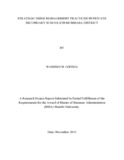| dc.contributor.author | Githua, Wanjiku N | |
| dc.date.accessioned | 2013-03-15T08:16:32Z | |
| dc.date.issued | 2011 | |
| dc.identifier.citation | Masters in Business Administration | en |
| dc.identifier.uri | http://erepository.uonbi.ac.ke:8080/xmlui/handle/123456789/13999 | |
| dc.description.abstract | This research project report is based onstrategic management concept entitled
strategic issue management practices in private secondary schools in Mombasa
District of Mombasa County. The report gives the research findings on two research
objectives namelyestablishing the strategic issues management practices in private
secondary schools and the factors that influences the SIM practices in Mombasa
district. The research report traces the conceptual framework of application of SIM
practices in environmental diagnosis or the situational analysis in which a business
firm finds itself in when carrying out its mandate within a given environmental
setting. The report mainly concentrates on a study background of strategic
management practices that requires the use of SIM in creating a fit between what the
environment offers and what the firm requires and offers.
The context of the research is the private secondary schools in Mombasa district.
There were fourteen government registered secondary private schools by the date of
this research. All the schools were issued with a questionnaire but only nine
cooperated and filled the representing 64% of the targeted sample frame. The schools
were selected due to their suitability to give relatively authentic findingsthat can be a
representative of other cosmopolitan regions in the Mombasa Countyand the whole
country in general, where private schools are located.
The research design employed in the research is descriptive census survey. The
questionnaire method of collecting primary data and the statistical package for social
science (SPSS) was used to analyze the data. The analyzedresults have been
interpreted both quantitatively for closed ended questionsand qualitatively for open
ended questions. The data is presented in descriptive statistical measures of
frequencies, percentages and cumulativefrequencies. Pie charts have also been used
to present the deduced results.
The results indicate that the majority of the target schools employSIM practices as a
tool in strategic management. The main factors that influence the application of SIM
are mainly external with increased competition leading with 77.8% of the respondents
agreeing that it has impact on the in their schools’ activities. The government
legislatives and directives and changes in syllabus at 44.4% and 55.5% respectively
also said to have some impact. The fact that majority of the schools classified the
issues in terms of urgency with urgent and requiring immediate action taking the
lion’s share of 44.4%is a clear indication that SIM is applied in situational diagnosis.
Also the findings indicated that over 66% of the schools regard SIM as an important
endeavor to undertake during the situational analysis.
The results therefore leads to the conclusion that the stakeholders in education
industry especiallyprivate secondary schools need to be very much concerned with
the strategic issues that arise from the environment so that they can respond to them in
real time. Therefore, it has been recommended that similar researches need to be
carried out in other levels and sectors of education industry such as public secondary
schools, primary level, tertiary colleges and universities. The research is therefore
very useful in giving insights in strategic management practices of educational
institutions. | en |
| dc.language.iso | en | en |
| dc.subject | private Secondary schools in Mombasa district | en |
| dc.title | Strategic issue management practices in private Secondary schools in Mombasa district | en |
| dc.type | Thesis | en |
| local.publisher | School of Business | en |

